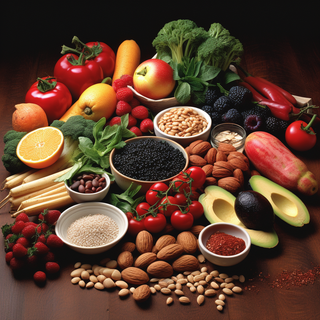Picture this: a culinary clash of titans that ignites the debate of the century.
In one corner, we have the heavyweight champion – Whole Foods, fresh, flavorful, and straight from Mother Nature's bounty. In the other corner, the agile contender – Supplements, compact powerhouses that promise the world in a pill.
The stage is set, the spotlight shines, and it's time for the ultimate showdown – Whole Foods vs. Supplements!
Unmasking the Superstars: Whole Foods
History shows us, even the ancient Greeks sculpted statues of produce, and immortalized the splendor of the bursting vibrant colors and flavors that dance on your taste buds. Whole foods are the quintessential part of a healthy lifestyle. They are like the VIP ticket to the concert of nutrition, offering not only nourishment but also an unforgettable experience.
 Imagine indulging in the juicy sweetness of a ripe peach, the crisp crunch of a garden-fresh salad, or the hearty embrace of a warm, homemade soup. These delights are nature's masterpiece, delivering a symphony of vitamins, minerals, antioxidants, and fiber that your body craves.
Imagine indulging in the juicy sweetness of a ripe peach, the crisp crunch of a garden-fresh salad, or the hearty embrace of a warm, homemade soup. These delights are nature's masterpiece, delivering a symphony of vitamins, minerals, antioxidants, and fiber that your body craves.
 Supplements: The Bold Challengers
Supplements: The Bold Challengers
Supplements, on the other hand, arrive with a cape of convenience, promising to save the day with a quick gulp. But are they truly the superheroes they claim to be? Don't get us wrong – supplements do have their merits, especially in addressing specific deficiencies or meeting unique dietary needs. However, they should not be your go-to sidekick for every nutritional endeavor.
Busting the Myths: A Nutritional Reality Check
Now, let's tackle some myths that have clouded the arena.
Myth #1: Supplements can replace whole foods. Sorry, but a pill won't capture the magic of a rainbow-hued plate brimming with nourishment. Whole foods offer a treasure trove of nutrients working synergistically, and no supplement can replicate that intricate dance.
Myth #2: More is better. Not so fast! Overloading on supplements without guidance is like juggling flaming torches blindfolded. Excessive doses can lead to imbalances and even toxicity. Remember, quality beats quantity any day.
 The Nutritional Showdown: Why Whole Foods Reign Supreme
The Nutritional Showdown: Why Whole Foods Reign Supreme
Jessica Jones, Nutritionist and Registered Dietitian, emphasizes, "Whole foods are a powerhouse of nutrients that work together to support overall health. Supplements can play a role, but they should never replace the nutritional richness of a balanced diet."Last year, Dr. Jones was recognized in SELF magazine - namedone of 17 dietitians to go-to for truly trustworthy advice, and this year she started an official health & nutrition column for the magazine. She also co-wrote, 28 Day Plant Powered HealthReboot cookbook. All the 100 recipes have a healthy balance of carbohydrates, fat and protein and are typically between 300 and 500 calories per meal.
Abbey Sharp, Registered Dietitian (RD), food and nutrition blogger, award winning cookbook author, a YouTuber, TV host and the founder of Abbey’s Kitchen Inc. Abbey Sharp Abbey has a BSc. in Applied Science for Food & Nutrition Studies, has completed an accredited dietetic internship, and is currently regulated as a registered dietitian by the Ontario College of Dietitians. She’s also the best-selling author wrote, “TheMindful Glow Cookbook”, highlights the importance of embracing whole foods. "When we eat whole, nutrient-dense foods, we're not just feeding our bodies; we're nurturing our well-being from the inside out."
Dr Michael Greger, FACLM, is a physician, author, and internationally recognized speaker on several important public health issues. What’s most impressive about Dr. Greger’s work, along with his knowledge base, is that all proceeds from his speaking engagements, the sale of his books, and DVDs, are all donated to charity!
Dr. Greger’s more recent books — How Not to Die, the How Not to Die Cookbook, and How Not to Diet — became instant New York Times Best Sellers. His latest two books, How to Survive a Pandemic and How Not to Die Cookbook, were released in 2020. View the trailer for How Not to Die here, for How Not to Diet here, and for How to Survive a Pandemic here.
 The Verdict: Making Wise Choices
The Verdict: Making Wise Choices
In the grand duel of Whole Foods vs. Supplements, the winner is clear: Whole Foods take the crown for overall nutrition and wellbeing. Supplements have their moments, but they're best used to complement a nutritious day, not replace it.
Picture this: a plate laden with luscious fruits, crisp veggies, lean proteins, and wholesome grains. Each bite is an adventure, a taste of colorful and powerful superfoods and nature’s symphony, and a testament to your commitment to holistic health. Supplements? They're your trusty sidekick, filling in gaps when needed, but never stealing the spotlight from your whole food cast. The Real MVP.
So, here you have it! The epic myth that Supplements compare to Whole Foods. Backed by expert insights and trusted resources. While the former may have a flashy entrance, it's the latter that steals the show in the long run. Your body deserves the nourishing embrace of whole foods, delivering not only sustenance but also joy, flavor, and vitality.
Join us in celebrating the wonder of fresh, vibrant whole foods at SportPort Active Nutrition Blogs.
Let your plate be your canvas, your palette the brush, and your health the masterpiece. It's a journey of indulgence, enlightenment, and empowerment, all served up on a plate of wholesome goodness.


